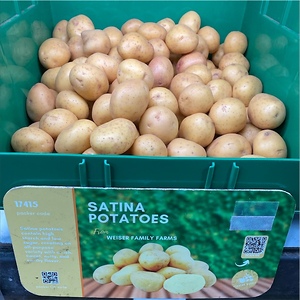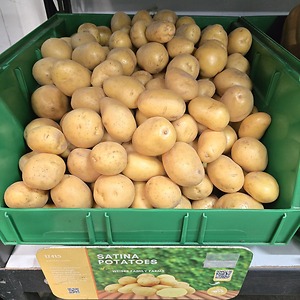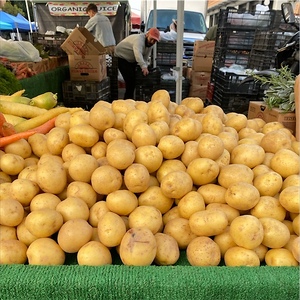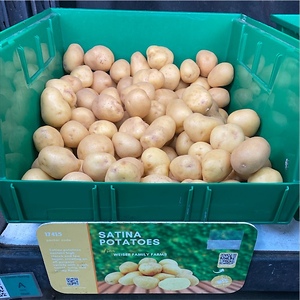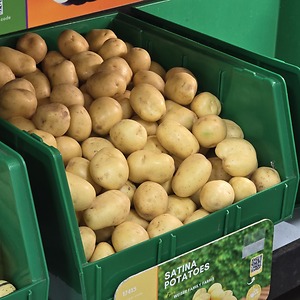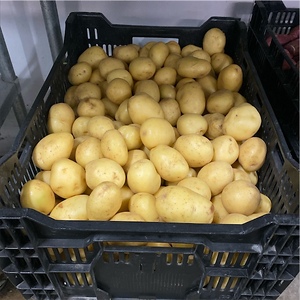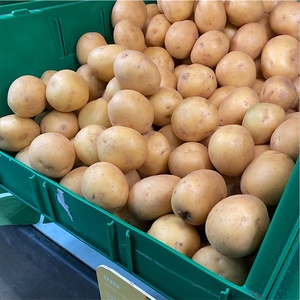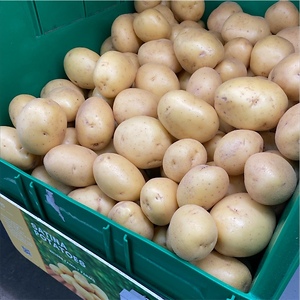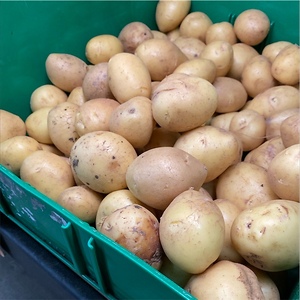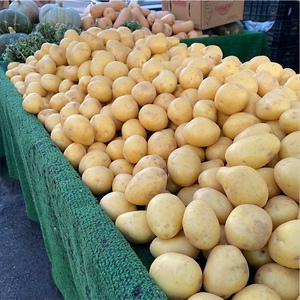

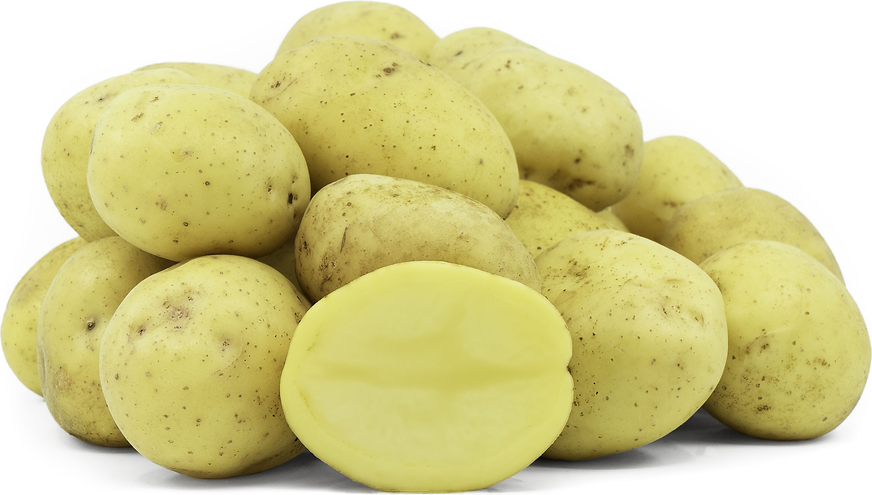
Satina Potatoes
Estimated Inventory, 50 lbs : 0.80
This item was last sold on : 04/17/25
Description/Taste
Satina potatoes are a small to medium-sized varietal, averaging 90 to 130 grams in weight, and have an oval to round shape with blunt, slightly tapered ends. The potato’s skin is thin, taut, and smooth, covered in a light netting. The skin also showcases golden yellow tones with brown speckling and shallow eyes. One of the distinct characteristics of Satina potatoes is their smooth, satin-like appearance. Depending on how the variety is grown, some tubers can have an almost polished look. The tubers will also feel slightly soft to the touch, an indication of the flesh’s tender consistency. When cooked, the golden yellow flesh is fine-grained, dense, and moist, developing a creamy, velvety texture. Satina potatoes contain high starch and low sugar, creating an all-purpose variety with a rich, sweet, nutty, and earthy flavor.
Seasons/Availability
Satina potatoes are available year-round.
Current Facts
Satina potatoes, botanically classified as Solanum tuberosum, are a German variety belonging to the Solanaceae or nightshade family. The early to mid-season cultivar was developed in the late 20th century as an improved variety for commercial and home garden cultivation. Satina potatoes are a multi-purpose tuber generally ready for harvest 65 to 80 days after sowing. The cultivar was named after its smooth, satin-like skin and flesh and is favored by growers for its resistance to disease, high yields, drought tolerance, and extended storage capabilities. Chefs and home cooks choose Satina potatoes for their versatility and earthy, nutty, and rich flavor. The potatoes can be used in any recipe calling for standard potatoes and provide a creamy consistency while also holding their shape well in specific preparations.
Nutritional Value
Satina potatoes are a source of fiber to regulate the digestive tract and vitamin C to strengthen the immune system while reducing inflammation. The tubers also provide potassium to balance fluid levels within the body, phosphorus and calcium to build strong bones and teeth and contain other nutrients, including B vitamins, iron, and additional antioxidants.
Applications
Satina potatoes have a rich flavor and smooth texture suited for cooked preparations. The tubers must be cooked before consumption and typically cook faster than other varieties due to their softer flesh. Satina potatoes are a multi-purpose variety that can be mashed, boiled, roasted, baked, and fried. The tubers are popularly boiled and mixed into salads, mashed and fried into fritters, sliced and tossed into curries, stews, and soups, or cut and baked into fries. The potatoes can also be incorporated into casseroles, folded into potato pancakes, dumplings, and bagels, fried into hashes, breakfast dishes, and burritos, or roasted as a savory, filling side dish to main meat dishes. Satina potatoes pair well with herbs such as parsley, rosemary, and thyme, leeks, garlic, shallots, meats including pork, beef, poultry, and lamb, fish, and eggs. Whole, unwashed Satina potatoes will keep for several weeks when stored in a cool, dry, and dark place away from direct sunlight.
Ethnic/Cultural Info
Potatoes are known as kartoffel in Germany, a name derived from the Italian word “tartufolo,” meaning “truffles.” Despite the truffle-derived name, potatoes are not related to truffles and were given this moniker from Italians learning about the tubers through the Spanish. In Europe, Italians were the first to attempt to cultivate potatoes and acquired the tubers from the Spanish, who thought the potatoes were initially a type of truffle when they gathered them from South America. Potatoes were introduced to Germany in the mid 16th century and were viewed as a poor man’s food, only grown among peasants. The German public was uninterested in the starchy tubers until the 18th century, when the German king “Fredrick the Great” ordered all farmers to cultivate potatoes when the wheat crops were failing. By the mid-18th century, Germans were growing potatoes across the country, and the tubers were slowly being accepted as a culinary ingredient. New varieties were also created over time, including cultivars such as Satina. After the potato’s acceptance into German kitchens, one of the most well-known potato dishes from Germany was the German potato salad. This potato salad comprises boiled potatoes mixed with onions, bacon, and a sweet and tangy dressing. In Germany, the dish is simply known as potato salad, but when German immigrants introduced the recipe in the United States, it became known as a German potato salad or hot German potato salad to differentiate between other potato salad dishes. There are several variations of this salad in the modern day, but each recipe incorporates a balanced blend of sweet, salty, tangy, and sour flavors.
Geography/History
Satina potatoes were developed in Hamburg, Germany, and were bred by Holger Laue and Saka Pflanzenzucht GbR. The cultivar was created in 1981 from a cross between puntilla potatoes and a numbered variety known as H99/73 and was released commercially as an improved all-purpose potato. Much of the history of Satina potatoes is unknown, but after its release to markets, Satina potatoes became a favored home garden and commercial cultivar in Germany. The variety is also grown throughout Europe, especially eastern Europe, and was later introduced to the New World, where it was registered in Canadian databases in 2010. Today Satina potatoes are produced through commercial farms and grown in home gardens in the United States, Canada, Europe, and Russia. The variety is favored for its adaptability to be planted in diverse soil types, climates, and growing conditions.
Featured Restaurants
Restaurants currently purchasing this product as an ingredient for their menu.
| Catania La Jolla | La Jolla CA | 619-884-5350 |
| Secret Sister | San Diego CA | 619-281-0718 |
| Lodge at Torrey Pines Main | San Diego CA | 858-453-4420 |
Recipe Ideas
Recipes that include Satina Potatoes. One
| My Saratoga Kitchen Table |
|
SHEPHERD'S PIE |
| CopyKat Recipes |
|
Scalloped Potato Recipe |



